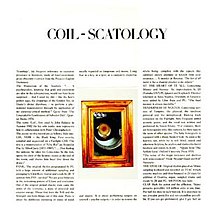| Scatology | ||||
|---|---|---|---|---|
 An original Scatology LP cover featuring the "Anal Staircase" postcard | ||||
| Studio album by | ||||
| Released | 1984[a] | |||
| Recorded | 1984 (See "Background and recording" section for details) | |||
| Studio |
| |||
| Genre | ||||
| Length | 41:29 | |||
| Label |
| |||
| Producer |
| |||
| Coil chronology | ||||
| ||||
| Singles from Scatology | ||||
| ||||
| Review scores | |
|---|---|
| Source | Rating |
| AllMusic | |
| Encyclopedia of Popular Music | |
| Melody Maker | favourable[4] |
| NME | positive[5] |
| Sounds | 4.75/5[6] |
| Time Out | positive[7] |
Scatology is the debut studio album by English experimental music group Coil. It was recorded at various studios in London during 1984 and produced by the band along with JG Thirlwell; the album features a prominent appearance of Stephen Thrower, who subsequently became an official member of Coil starting with the group's following album, Horse Rotorvator. Despite its title, the album focuses on alchemy, mainly an idea of turning base matter into gold. The record contains a wide array of cultural references, including to people such as Marquis de Sade, Alfred Jarry, Salvador Dalí, Charles Manson, and others.
Scatology was first released in 1985 (with a 1984 copyright date) on LP, by Force & Form and K.422 (Some Bizzare Records sublabel). It was reissued by Force & Form in 1988 on CD and later by Threshold House in 2001. Scatology’s sole single featured the extended remix of "Panic" with a cover version of "Tainted Love" on its B-side. Mainly positively received by critics, Scatology is considered to be one of Coil's essential releases, and moreover of the 1980s industrial scene.
Cite error: There are <ref group=lower-alpha> tags or {{efn}} templates on this page, but the references will not show without a {{reflist|group=lower-alpha}} template or {{notelist}} template (see the help page).
- ^ a b Skip Jansen. "Scatology - Coil". AllMusic. All Media Network. Retrieved May 20, 2017.
- ^ Jansen, Skip. "Coil - Musick to Play in the Dark". AllMusic. Retrieved 29 November 2018.
- ^ Larkin, Colin, ed. (1998). "Coil". Encyclopedia of Popular Music. Vol. 2 (3rd ed.). London, New York: Muze, Grove's Dictionaries. pp. 1155–1156. ISBN 1-56159-237-4. LCCN 98-37439. OCLC 1033565487 – via the Internet Archive.
- ^ Balmer, Mark (January 1985). "Chemistry Set" (scan). Melody Maker. Retrieved April 24, 2018 – via Brainwashed archive.
- ^ Kopf, Biba (February 9, 1985). "Mined Like a Sewer" (scan). NME. Retrieved March 16, 2018 – via Brainwashed archive.
- ^ Tibet (February 9, 1985). "Stool Pigeons" (scan). Sounds. Retrieved March 16, 2018 – via Brainwashed archive.
- ^ Gill, John (January 30, 1985). "Coil 'Scatology' (K422/Rough Trade)" (scan). Time Out. Retrieved March 16, 2018 – via Brainwashed archive.